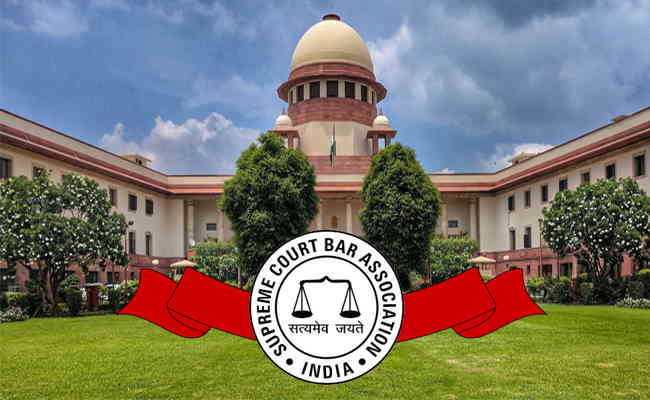On Monday, the Supreme Court Bar Association (SCBA) approached the apex court to challenge the Standard Operating Procedure (SOP) issued by it for starting a hybrid hearing on March 15.
The plea of the SCBA sought the quashing of the SOPs for a hybrid physical hearing before the Court issued by the Registry on March 5, claiming it was issued without consulting the Bar.
It requested the court to direct the Registry not to issue any circular without consulting the Bar.
The plea said SOP was issued without consulting the Bar even though Bar is an equal stakeholder in the dispensation of the justice delivery system and the suggestions given by the Bar ought to have been taken into consideration.
“There is a general feeling in the Bar that for the last few years, the Registry has been issuing circulars without taking the Bar into confidence, even though the circulars issued directly affects the lawyers practicing before this Court. In the meeting of the Executive Committee of the SCBA with the chief justice of India on March 1, 2021, regarding the physical/hybrid hearing it was assured that the needful would be done by the Registry expeditiously taking into consideration the suggestions given by the Executive Committee. However, the SOP dated March 5, 2021, has been issued unilaterally by the Registry,” the plea said.
The SCBA has decided not to accept the Supreme Court’s SOP for a hybrid mode of hearing commencing from March 15.
The Supreme Court has decided to begin a hybrid mode of hearing (physical and virtual) on an experimental basis from March 15. Supreme Court said a pilot basis final hearing/regular matters listed on Tuesdays, Wednesdays, and Thursdays will be heard through hybrid mode.
The Secretary-General of the Supreme Court in a circular issued on March 5 has said that the Chief Justice of India SA Bobde has issued some directions on commencing of the hybrid mode of hearing in the apex court.
“On an experimental basis, and as a pilot scheme, the final hearing/regular matters listed on Tuesdays, Wednesdays, and Thursdays may be heard in the hybrid model, as may be decided by the Bench, considering the number of parties in a matter as well as the limited capacity of the Courtrooms; all other matters, including those listed on Mondays and Fridays shall continue to be heard through video/teleconferencing mode,” the circular said.
Unless otherwise directed by the Bench, final hearing/regular matters where the number of advocates for the parties is more than the average working capacity of the courtrooms, as per Covid-19 norms, i.e. 20 per courtroom at any given time, shall invariably be listed for hearing through video/teleconferencing mode, it further added.
The circular said, “If in a matter listed for hybrid hearing, the number of parties is more, then Advocate on Record (AOR) and one arguing counsel per party will be allowed entry; one registered clerk per party, as may be chosen by the AOR, shall be allowed entry to carry paper-books/journals, etc. of the counsels up to the Court-rooms.”
It said that in hybrid hearing, all the counsels appearing for one party can appear either through physical presence or through video/teleconferencing.
The circular further said that wearing masks, frequent use of hand sanitiser and maintaining physical distancing norms is mandatory for all entrants into the Supreme Court premises, including into the Court-rooms.
The Supreme Court has been hearing cases through video-conference mode for almost a year following the COVID-19 pandemic.
Source Link




